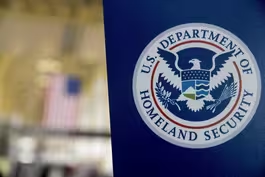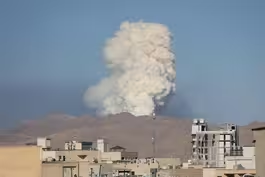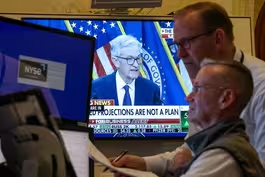
Israel's attack on Iran puts the U.S. in a difficult spot
Clip: 6/18/2025 | 7m 33sVideo has Closed Captions
How Israel's attack on Iran puts the U.S. in a difficult situation
For perspective on the current state of affairs between Iran and Israel, Geoff Bennett speaks with Ernest Moniz, secretary of energy during the Obama administration and a key negotiator and architect of the Iran nuclear agreement that was signed in 2015 before President Trump pulled the U.S. out of the agreement.
Problems playing video? | Closed Captioning Feedback
Problems playing video? | Closed Captioning Feedback
Major corporate funding for the PBS News Hour is provided by BDO, BNSF, Consumer Cellular, American Cruise Lines, and Raymond James. Funding for the PBS NewsHour Weekend is provided by...

Israel's attack on Iran puts the U.S. in a difficult spot
Clip: 6/18/2025 | 7m 33sVideo has Closed Captions
For perspective on the current state of affairs between Iran and Israel, Geoff Bennett speaks with Ernest Moniz, secretary of energy during the Obama administration and a key negotiator and architect of the Iran nuclear agreement that was signed in 2015 before President Trump pulled the U.S. out of the agreement.
Problems playing video? | Closed Captioning Feedback
How to Watch PBS News Hour
PBS News Hour is available to stream on pbs.org and the free PBS App, available on iPhone, Apple TV, Android TV, Android smartphones, Amazon Fire TV, Amazon Fire Tablet, Roku, Samsung Smart TV, and Vizio.
Providing Support for PBS.org
Learn Moreabout PBS online sponsorshipFor perspective on the current state of affairs, we turn now to Ernest Moniz.
He was secretary of energy during the Obama administration and a key negotiator and architect of the Iran nuclear agreement that was signed in 2015.
President Trump pulled the U.S. out of that agreement in 2018, saying he could negotiate a better one.
Mr. Secretary, thanks for being with us.
So, Washington right now is focused on whether the president should order a strike on Iran's Fordow facility.
This is that heavily fortified facility, and that's buried deep inside a mountain.
What's your view?
Would you advise military action or urge restraint?
ERNEST MONIZ, Former U.S. Energy Secretary: Well, I think it's a complex situation, although I will come to a conclusion.
First of all, I think the Israeli strike really has put the United States in a difficult position, in the sense that the United States has the only capacity to at least potentially eliminate Fordow, the underground enrichment site.
And, without doing that, frankly, the campaign to eliminate Iran's nuclear program, even temporarily, obviously would not be at all complete.
On the other hand, if the United States were to carry through with that threat to bomb Fordow, A, we would be involved in the war, quite clearly, and, B, we cannot bomb the program out of existence.
It will just revive in some period of time.
It might be years, but it would revive, unless the political regime in Tehran were to totally change in a favorable direction.
That's a big gamble.
In the end, weighing all of that, I would argue against the United States bombing Fordow.
GEOFF BENNETT: So is Fordow really the lynchpin of Iran's nuclear program?
ERNEST MONIZ: Well, I wouldn't say it's the lynchpin, in the sense that, if other facilities continue to operate, the enrichment could be done there as well.
But the reality is, Natanz, the main enrichment site, certainly the aboveground part, I think, has been pretty much devastated.
We don't know, at least I don't know the condition of the centrifuges in the underground facility.
But, clearly, the one place that has not been touched is Fordow.
It has now something that it wouldn't have had under the 2015 agreement, namely, an array of much more advanced centrifuges, six times as powerful as the ones that the 2015 agreement allowed, in operation there.
In 2015, when we reached the JCPOA agreement, the Iran agreement, Iran was operating about 19,000 centrifuges.
Now about 1,000 of their advanced centrifuges would be enough to produce the material for a bomb every year.
GEOFF BENNETT: So, on that point, how close do you believe Iran is to producing a nuclear weapon?
The U.S. intelligence community said previously that not only was Iran not focused on producing a nuclear weapon, that they were years away from being able to produce and deliver one.
Just today, President Trump said he didn't really care what the U.S. intel assessment is, that he believes Iran is weeks away from producing a nuclear weapon.
Where do you land?
ERNEST MONIZ: Well, I think we're comparing apples and oranges here.
First of all, Iran, as we know, had enriched uranium for no good civil reason, civilian reason, to about 60 percent purity enrichment.
That's very, very close to the 90 percent that you would need for a significant nuclear weapon.
And they had enough material there to produce probably about 10 weapons.
And they could reach that weapons-grade material within weeks.
No question about it.
Having weapons-grade uranium is the most challenging part of making a nuclear weapon, but it's not the entire weapon.
So what the intelligence community statement is about is what it would take then to go from the material to, I would say, an advanced nuclear weapon that could be seated on and delivered by a missile.
Given the material, I think Iran would go for a much cruder nuclear weapon, one that could be delivered not on a missile, but by other means, trucks, ships, et cetera.
It's been shown that they have a hard time delivering weapons on Israel, certainly weapons of any major size.
So I think that's a bigger challenge for Iran.
How would they actually deliver a weapon?
Given the material they have, they could pretty easily covertly develop and put together a crude weapon.
But, again, they have to be able to deliver it.
And that's not trivial.
GEOFF BENNETT: President Trump has left the door open, albeit narrowly, to talks.
What would it take for meaningful U.S.-Iran negotiations to resume at this stage?
ERNEST MONIZ: Well, at this stage, I certainly don't think serious negotiations can take place until the hostilities between Israel and Iran are over.
And that assumes that the United States has not gotten directly involved in the war, other than for defensive purposes, in helping to defend Israel against missiles and drones.
I think there's been a fairly public, frankly, preparation by the military to be able to carry out a bombing of Fordow with a very, very large conventional so-called bunker-buster.
That -- of course, that threat can be carried out, but it's also a threat for a negotiation.
I believe the president would still prefer the option, frankly, of a diplomatic solution.
And a real serious question will be, will the president, will the United States accept a kind of a two-step, in which the first step does not certainly have a complete renunciation by Iran of its nuclear capabilities, but has a serious dialing back of those?
And then that would allow for a follow-on negotiation, whereby various mechanisms could be used to potentially satisfy both sides.
GEOFF BENNETT: Former Energy Secretary Ernest Moniz, now the CEO of the Nuclear Threat Initiative, thank you for adding some much-needed context and clarity to all of this.
We appreciate it.
ERNEST MONIZ: Thank you.
Biography documents life of pioneering LGBTQ rights activist
Video has Closed Captions
Clip: 6/18/2025 | 6m 12s | New biography documents life of pioneering LGBTQ rights activist Marsha P. Johnson (6m 12s)
Homeland Security official on Trump's immigration policy
Video has Closed Captions
Clip: 6/18/2025 | 9m 28s | Homeland Security official on the Trump administration's immigration policy changes (9m 28s)
How misinformation spread after Minnesota lawmaker's murder
Video has Closed Captions
Clip: 6/18/2025 | 6m 58s | How misinformation spread after Minnesota lawmaker's murder (6m 58s)
Iran rejects Trump's calls for surrender amid Israeli attack
Video has Closed Captions
Clip: 6/18/2025 | 3m 27s | Iran rejects Trump's calls for surrender amid Israel's ongoing bombardment (3m 27s)
News Wrap: Fed leaves interest rates unchanged
Video has Closed Captions
Clip: 6/18/2025 | 5m 24s | News Wrap: Fed leaves interest rates unchanged while signaling future cuts (5m 24s)
States agree to Purdue Pharma settlement over opioid crisis
Video has Closed Captions
Clip: 6/18/2025 | 5m 58s | U.S. states agree to multi-billion dollar settlement with Purdue Pharma over opioid crisis (5m 58s)
Supreme Court upholds law banning gender-affirming care
Video has Closed Captions
Clip: 6/18/2025 | 8m 1s | Supreme Court upholds Tennessee law banning gender-affirming care for transgender minors (8m 1s)
Providing Support for PBS.org
Learn Moreabout PBS online sponsorshipSupport for PBS provided by:
Major corporate funding for the PBS News Hour is provided by BDO, BNSF, Consumer Cellular, American Cruise Lines, and Raymond James. Funding for the PBS NewsHour Weekend is provided by...


















